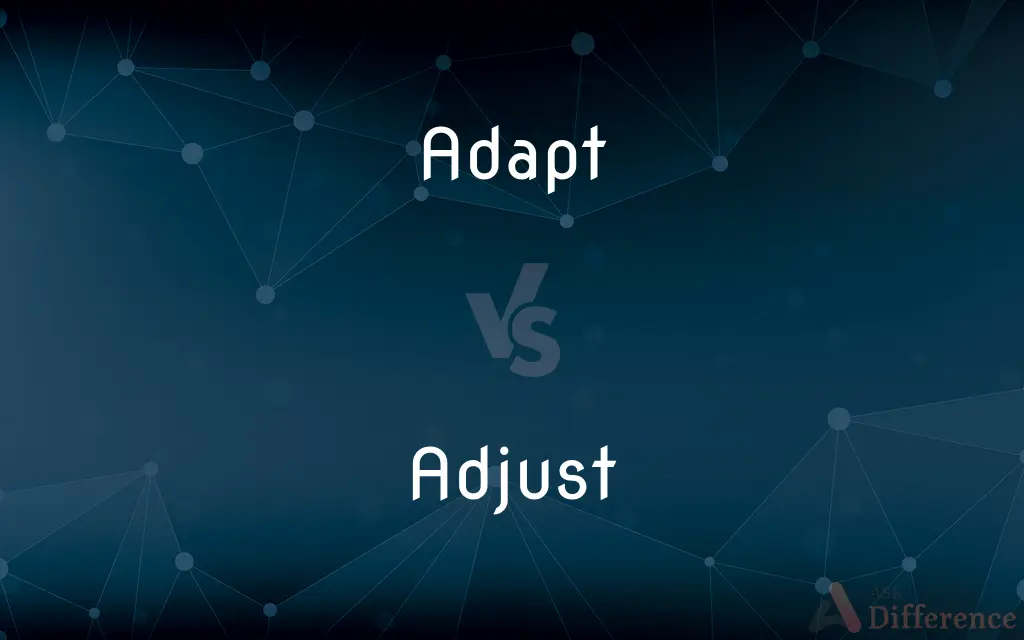Adapt vs. Adjust — What's the Difference?
By Tayyaba Rehman — Updated on October 25, 2023
"Adapt" means to change oneself to fit different conditions, while "adjust" means to make minor changes to achieve a desired fit or function.

Difference Between Adapt and Adjust
Table of Contents
ADVERTISEMENT
Key Differences
"Adapt" often conveys a deeper or more comprehensive change, where an individual or species changes to better suit a new environment or condition. On the other hand, "adjust" typically implies making smaller, more immediate changes to ensure something works or fits properly.
To "adapt" usually indicates a longer process of becoming suited to a new environment or situation, requiring more holistic changes. Conversely, to "adjust" might mean tweaking certain aspects of something to make it function correctly in its current environment.
When organisms "adapt" to their surroundings through evolution, they undergo physical or behavioral changes over generations. Meanwhile, if someone "adjusts" a watch, they are making minor modifications to ensure it tells time accurately.
Think of "adapt" as reshaping oneself or evolving to fit into a new mold. In contrast, "adjust" is like fine-tuning, ensuring that something aligns correctly or functions optimally without fundamentally changing its nature.
In terms of personal growth, individuals might "adapt" to a new culture by adopting its customs and ways of thinking. In a simpler scenario, one might "adjust" their daily routine slightly to accommodate a new exercise regimen.
ADVERTISEMENT
Comparison Chart
Nature
Fundamental change to fit a new condition
Minor modifications for proper function
Depth of Change
Often deeper and more holistic
Generally surface-level or immediate
Duration
Implies a longer process
Suggests quicker or immediate changes
Use in Biology
Evolutionary changes in organisms
Tweaking conditions for an experiment
Personal Context
Adopting a new culture
Modifying a daily routine
Compare with Definitions
Adapt
To evolve in response to environmental conditions.
These plants have adapted to thrive in desert conditions.
Adjust
To make corrections or modifications for better alignment or function.
The mechanic adjusted the brakes on my car.
Adapt
To change or modify to fit a particular situation or environment.
Animals in the Arctic have adapted to the cold.
Adjust
To set instruments or devices for proper functioning.
Adjust the clock to match the current time.
Adapt
To adjust to new conditions or environment over time.
Immigrants often adapt to the customs of their new country.
Adjust
To change or alter to achieve a better fit or condition.
He adjusted the straps of his backpack.
Adapt
To make suitable or fit for a specific use or situation.
The director adapted the play into a movie.
Adjust
To adapt or conform to new conditions or surroundings.
It took time to adjust to the time difference after traveling.
Adapt
To undergo modification to better suit a particular set of circumstances.
His speech style adapted depending on his audience.
Adjust
To move or change (something) so as to be in a more effective arrangement or desired condition
Adjust the timing of a car's engine.
Adjust a hearing aid to amplify lower frequencies.
Adapt
To make suitable to or fit for a specific use or situation
Adapted the novel into a movie.
Adapted the company policy to take internet use into account.
Adjust
To change so as to be suitable to or conform with something else
Adjusted the schedule to allow for everyone's vacation plans.
Adjusted the old monetary figures to account for inflation.
Adapt
To cause to be able to survive and reproduce under certain conditions. Used in the passive
“Every species is adapted to a rather restricted selection of properties of the environment” (Ernst Mayr).
Adjust
In chiropractic medicine, to manipulate (the spine and other body structures) to treat disorders and restore normal function of the nervous system.
Adapt
To change in order to meet the requirements of new circumstances or conditions
The music business had to adapt to digital technology.
Adjust
To decide how much is to be paid on (an insurance claim).
Adapt
To become able to survive and reproduce under certain conditions
Hawks have adapted to living in cities.
Adjust
To become adapted or accustomed, as to a new situation
Have you adjusted to working with your new colleagues?.
Adapt
(transitive) To make suitable; to make to correspond; to fit or suit
Adjust
(transitive) To modify.
Morimoto's recipes are adjusted to suit the American palate.
Adapt
(transitive) To fit by alteration; to modify or remodel for a different purpose; to adjust
To adapt a story for the stage
To adapt an old machine to a new manufacture
Adjust
(transitive) To improve or rectify.
He adjusted his initial conclusion to reflect the new data.
Adapt
(transitive) To make by altering or fitting something else; to produce by change of form or character
To bring out a play adapted from the French
A word of an adapted form
Adjust
(transitive) To settle an insurance claim.
Adapt
(intransitive) To make oneself comfortable to a new thing.
They could not adapt to the new climate and so perished.
Adjust
(intransitive) To change to fit circumstances.
Most immigrants adjust quickly to a new community.
She waited for her eyes to adjust to the darkness.
Adapt
Adapted; fit; suited; suitable.
Adjust
To make exact; to fit; to make correspondent or conformable; to bring into proper relations; as, to adjust a garment to the body, or things to a standard.
Adapt
Fitted; suited.
Adjust
To put in order; to regulate, or reduce to system.
Adjusting the orthography.
Adapt
To make suitable; to fit, or suit; to adjust; to alter so as to fit for a new use; - sometimes followed by to or for.
For nature, always in the right,To your decays adapts my sight.
Appeals adapted to his [man's] whole nature.
Streets ill adapted for the residence of wealthy persons.
Adjust
To settle or bring to a satisfactory state, so that parties are agreed in the result; as, to adjust accounts; the differences are adjusted.
Adapt
Make fit for, or change to suit a new purpose;
Adapt our native cuisine to the available food resources of the new country
Adjust
To bring to a true relative position, as the parts of an instrument; to regulate for use; as, to adjust a telescope or microscope.
Adapt
Adapt or conform oneself to new or different conditions;
We must adjust to the bad economic situation
Adjust
Alter or regulate so as to achieve accuracy or conform to a standard;
Adjust the clock, please
Correct the alignment of the front wheels
Adjust
Place in a line or arrange so as to be parallel or straight;
Align the car with the curb
Align the sheets of paper on the table
Adjust
Adapt or conform oneself to new or different conditions;
We must adjust to the bad economic situation
Adjust
Make correspondent or conformable;
Adjust your eyes to the darkness
Adjust
Decide how much is to be paid on an insurance claim
Adjust
To modify for a more effective or suitable result.
She adjusted the recipe to make it less spicy.
Common Curiosities
Is "adjusting" a watch similar to "adapting" to a situation?
No, "adjusting" a watch means making minor modifications, while "adapting" implies a more comprehensive change to fit a situation.
Can the terms be used interchangeably?
While related, "adapt" and "adjust" have nuances; using them interchangeably can sometimes lead to confusion.
Can "adapt" be used in the context of media?
Yes, one can "adapt" a book into a film, meaning they've changed the format while maintaining the essence.
Does "adapt" imply a more in-depth change than "adjust"?
Yes, "adapt" typically suggests a deeper or more holistic change, while "adjust" implies smaller, immediate tweaks.
Do animals adapt or adjust to their environments?
Animals "adapt" to their environments over generations through evolutionary changes, but they can also "adjust" behaviors based on immediate conditions.
Can plants adapt?
Yes, plants can "adapt" to environmental conditions over generations.
Can "adjust" mean to get used to a new environment?
Yes, "adjust" can mean adapting to new conditions, but it usually implies a quicker process than "adapt."
Does "adjust" always mean a change is minor?
Typically, "adjust" suggests smaller changes, but the context can determine the extent of the change.
Is "adjust" more immediate than "adapt"?
Generally, "adjust" implies quicker changes, while "adapt" suggests a longer process.
Can businesses adapt?
Absolutely, businesses can "adapt" to market changes or "adjust" strategies for better outcomes.
How do "adapt" and "adjust" relate to personal growth?
Individuals might "adapt" to a new culture holistically, while they might "adjust" certain habits or routines for betterment.
Is "adjusting" to a situation the same as fully adapting?
Not necessarily; "adjusting" implies making suitable for the moment, while "adapting" often means a more lasting change.
Share Your Discovery

Previous Comparison
Cow vs. Pig
Next Comparison
Domaine vs. WatchAuthor Spotlight
Written by
Tayyaba RehmanTayyaba Rehman is a distinguished writer, currently serving as a primary contributor to askdifference.com. As a researcher in semantics and etymology, Tayyaba's passion for the complexity of languages and their distinctions has found a perfect home on the platform. Tayyaba delves into the intricacies of language, distinguishing between commonly confused words and phrases, thereby providing clarity for readers worldwide.















































